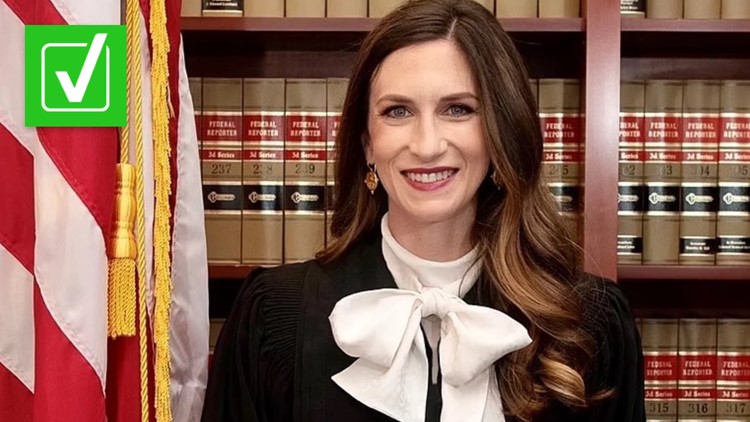On April 18, U.S. District Judge Kathryn Kimball Mizelle overturned the Centers for Disease Control and Prevention’s (CDC) national mask mandate covering planes and other forms of public transportation, a decision that drew both praise and criticism. The U.S. Department of Justice has since announced that it will appeal the decision.
In response to Mizelle’s ruling, some Twitter users – including former U.S. Secretary of Labor Robert Reich – seemed to suggest that the federal judge in Florida shouldn’t be in her position at all. Reich wrote in part that the American Bar Association had deemed Mizelle “unqualified” for the role. A VERIFY viewer also texted the team to ask if that’s true.
THE QUESTION
Did the American Bar Association deem U.S. District Judge Kathryn Kimball Mizelle “not qualified” for the role?
THE SOURCES
- The American Bar Association Standing Committee on the Federal Judiciary
- Questionnaire for judicial nominees from the United States Senate Committee on the Judiciary
- Record of questions from former Senate Judiciary Committee Ranking Member Dianne Feinstein
THE ANSWER
Yes, the American Bar Association did deem U.S. District Judge Kathryn Kimball Mizelle “not qualified” for the role.
WHAT WE FOUND
The American Bar Association (ABA) is a voluntary professional organization made up of lawyers and law students. The organization’s Standing Committee on the Federal Judiciary, which is made up of 15 lawyers who are appointed to three-year terms, conducts peer reviews of federal bench nominees when a person is nominated.
During these evaluations, the committee “focuses strictly on professional qualifications: integrity, professional competence and judicial temperament.” It does not consider a nominee’s “philosophy, political affiliation or ideology,” according to an explanation provided by the committee.
Former President Donald Trump nominated Mizelle as district court judge for the United States District Court for the Middle District of Florida in September 2020.
On the day of her nomination, the ABA Standing Committee sent a letter to Senate Judiciary Committee members that said a “substantial majority” of the committee determined Mizelle was “not qualified” for the role, while a “minority” determined she was qualified.
The Standing Committee’s letter said a nominee “ordinarily should have at least 12 years’ experience in the practice of law.” Mizelle was admitted to practice law in the state of Florida on Sept. 27, 2012, about eight years before the letter was sent, a “rather marked departure from 12-year minimum,” the committee said.
A questionnaire given to Mizelle by the Senate Judiciary Committee, along with her online biography, confirm that she graduated from law school in 2012. After graduation, she listed work as a law clerk for federal judges and counsel to the Associate Office of the Attorney General, among other roles.
Having less than 12 years’ worth of experience wouldn’t immediately deem Mizelle “not qualified,” as nominees with fewer years of experience “but with substantial trial or courtroom experience” or other accomplishments had been found “qualified” before, the committee said. The committee also took issue with the fact that Mizelle had not tried a civil or criminal case as lead or co-counsel.
“Ms. Mizelle has a very keen intellect, a strong work ethic and an impressive resume. She presents as a delightful person and she has many friends who support her nomination,” the Standing Committee letter reads. “Her integrity and demeanor are not in question. These attributes however simply do not compensate for the short time she has actually practiced law and her lack of meaningful trial experience.”
When questioned by then-Senate Judiciary Committee Ranking Member Dianne Feinstein in September 2020, Mizelle said she had tried two cases to verdict. She served as co-lead counsel and associate counsel in those cases, and had not graduated from law school at the time.
The Standing Committee’s letter also mentioned that Mizelle's four federal clerkships – one of which was in trial court – plus her 10 months at a law firm and approximately three years in government practice translated into five years of experience in trial courts. Feinstein asked Mizelle whether the ABA was “wrong” about this.
“While I am familiar with the ABA’s letter, I do not fully understand its methodology or why they omitted discussion of my litigation as a federal prosecutor where I appeared and argued in federal district court,” Mizelle said in response.
Mizelle served as special assistant to the United States Attorney’s Office for the Eastern District of Virginia from 2014-2015 and a trial attorney in the U.S. Department of Justice’s Tax Division from 2014-2017, according to her online biography.
The Standing Committee said in its letter that it had taken into account Mizelle’s experience in federal grand jury proceedings, “which are non-adversarial and do not take place before a judge.” The proceedings resulted in the defendant agreeing to a plea deal with no trial, according to the committee.
Despite the controversy over her qualifications following the committee’s letter, Mizelle was still confirmed by the Senate in a 49-41 vote.
From Jan. 20, 1989 – when the ABA began offering comprehensive data – to present, 22 judicial nominees have been rated “not qualified” by the ABA, according to Ballotpedia, an online political encyclopedia. Fifteen of those 22 were later confirmed by the Senate and six were withdrawn.



